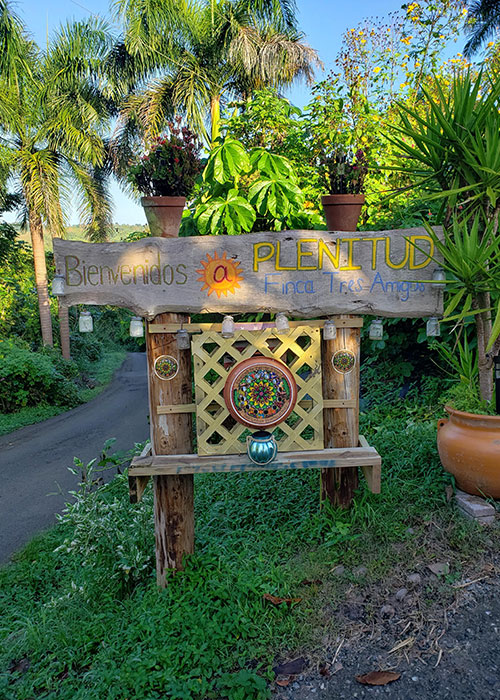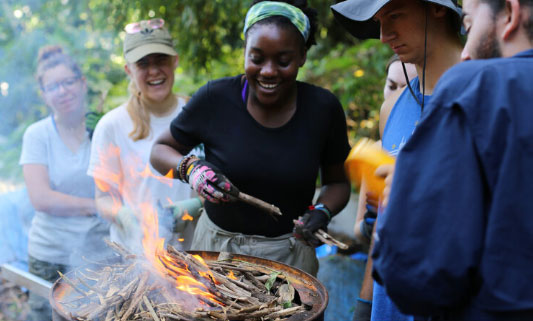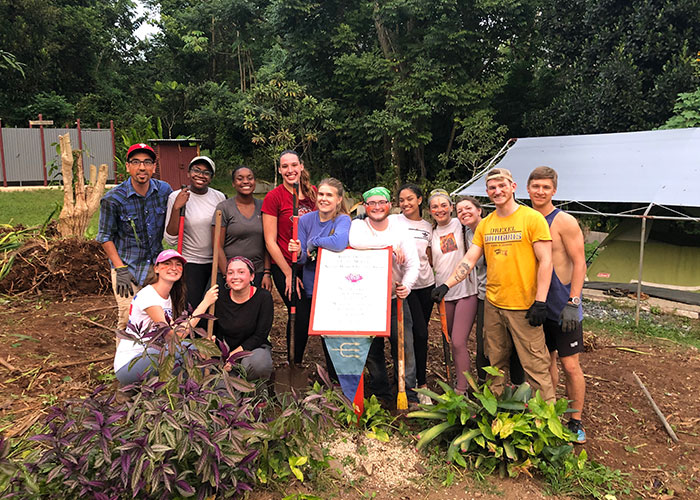Supporting Sustainability and Resilience in Las Marias, Puerto Rico
Community-based Learning Course (GST 231)
May 07, 2020
Written by Madison Betts, BA environmental studies and sustainability '23; Seona Boyle, BA environmental studies and sustainability '20; Alexis Wiley, BS environmental science '22; and Sarah Wirth, BA environmental studies and sustainability '20.
Leveraging our expertise to build a better future
The end of winter quarter and finals week at Drexel University had just wrapped up. Students and faculty were on their way home to their families for break, except for one group of twelve students and one faculty member, who were on their way to Puerto Rico. The students’ backgrounds varied: some from the College of Arts and Sciences, others from the College of Engineering, and a few from the Antoinette Westphal College of Media Arts & Design. Despite having different expertise, they had one thing in common: a vision for a more sustainable future.
The “Disaster and Resilience in Puerto Rico” Community-Based Learning (CBL) course, created and led by Steve Dolph, PhD, took these interdisciplinary students to Plenitud PR, a nonprofit educational farm and community dedicated to service in sustainability and the arts, located in Las Marias, Puerto Rico. Steve Dolph, PhD, is an assistant teaching professor of Spanish in the Department of Global Studies and Modern Languages. His research focuses on global diasporas and climate change, with a focus on Latin American countries and Spanish-speaking immigrants.
As a precursor to this CBL course, students could take his course “After Maria,” which discussed how the social, economic and political structures of Puerto Rico exacerbated the damage of Hurricane Maria, which hit the island in September 2017. The Puerto Rican community worked together to create and demand more sustainable solutions to this dire situation. Plenitud PR is just one of the communities in Puerto Rico that continuously works towards creating an environment that fosters this vision of a better, more viable future.
Learn more
 Bienvenidos a Plenitud PR!
Bienvenidos a Plenitud PR!
Sustainable practices, intentional living and permaculture design
Plenitud PR was founded in 2008 by a group of friends who had dreamed and worked together to create a community rooted in love and living in harmony with one another, the local and global community, and the earth. What started as just an idea blossomed into a fifteen-acre farm that practices intentional living, sustainability and permaculture design. Plenitud PR invites the Puerto Rican community to join workshops on sustainable practices including agricultural design principles of permaculture, bio-construction and rainwater harvesting.
Every year, they also welcome student groups from universities all over the United States to participate in service learning and hands-on activities at the farm and in the greater community of Las Marias. The students from Drexel University were the first academic group that the farm hosted, and the experience extended beyond what either group could have hoped for. Plenitud is hoping to build out more academic courses for students to dive deeper into specific practices of the farm, such as their rainwater harvesting systems studied by the Drexel students.
As a group, we engaged in various activities throughout the week both on and off the farm; among these activities were the installation of the rainwater harvesting system at a local school and the creation of biochar. Through fundraising initiatives, apprenticeship programs and service trips, Plenitud has been very successful in expanding the scope and impact of rainwater harvesting throughout various regions of the island. In a place like Puerto Rico, something as simple as having access to a rainwater reserve during times of disaster can mean the difference between life and death. This kind of access provides Puerto Ricans with a sense of power and freedom, despite living in a place that they feel is not their own.
Rainwater harvesting and filtration
Without filtration, however, rainwater that is captured in Puerto Rico is not considered potable. In an effort to create a natural filtration system that would filter Puerto Rico’s rainwater enough to be potable, Plenitud has begun to look into creating its own biochar. Biochar is a form of activated charcoal, a fine powdery dust that can be created from the burning of any biological plant material. In the case of a natural rainwater filtration system, biochar would serve as the last of three mediums water would pass through in the filtration process. Each of the three mediums and their purpose are outlined below.
- Rocks - remove solids from the water
- Sand - removes suspended and dissolved solids, as well as some bacteria
- Biochar - removes any leftover suspended and dissolved solids or bacteria and purifies the water before drinking
 Alexis making biochar with other Drexel students.
Alexis making biochar with other Drexel students.
While at Plenitud, our group was able to aid in the creation of the second batch of biochar ever made on the farm. The process involved harvesting dried coffee tree branches and cutting them into small pieces, placing these wood pieces
along with kindling into a metal barrel, and burning the wood using a top-lit, up-draft burning method, which deprives the burn of oxygen. Once complete, the result was a pile of completely black, activated charcoal pieces that would later be ground down to a powder for use in a future filtration system.
By taking part in these sustainable practices, our group was able to see firsthand how our work can bring communities together. When we finished projects together, we felt a type of gratification that only service within a community could produce. For that, we are grateful to Plenitud for sharing their community and welcoming us to learn and grow as individuals and as a group.
 A photo of the Drexel crew at Plenitud.
A photo of the Drexel crew at Plenitud.
Social justice activism
True to its mission, Plenitud is a model community for not only sustainable agriculture, but also for social justice activism. Along with its biochar development and rainwater collection, Plenitud uses initiatives and programs in sustainability, arts and culture, service learning and youth development to promote resilience throughout their community. This message was carried home with our class as we continue to work on various projects together after returning home.
Since our class’s return to Drexel University, we have discerned fourteen unique projects spanning publicity, technical support, public health, sustainability, service and community to continue our collaborative efforts with Plenitud. Every project is an ongoing voluntary service that we chose to support Plenitud’s community initiatives. Members of our cohort, John Card, Tais Idi-Infante and Alexis Wiley, have presented talks and a poster about our work with biochar. As a class, we hope to bring the values and knowledge of Plenitud to our local and personal communities through our work and demonstrate how service is love.